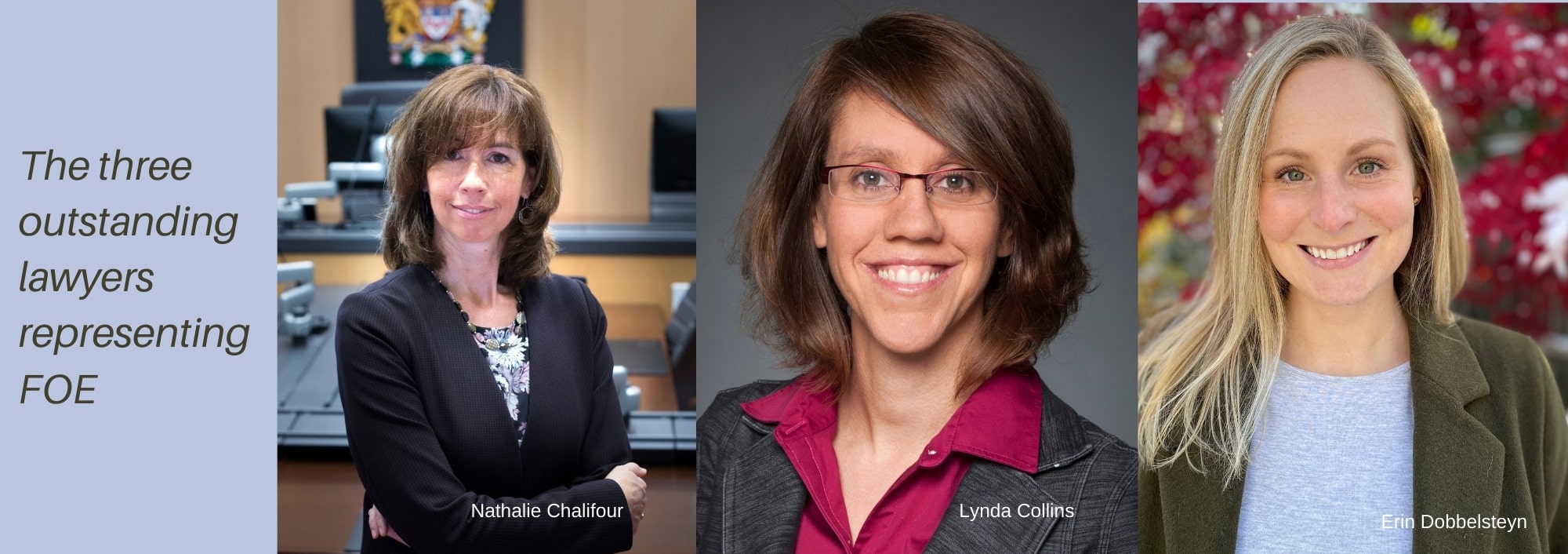
First ever climate Charter case to be heard by a Canadian court
Friends of the Earth Canada has won standing in a historic climate change court challenge. The case known as Mathur et. al. v. Her Majesty in Right of Ontario is the first ever climate Charter case heard by a Canadian court.
Seven young people are demanding that Ontario take real action on climate change and Friends of the Earth will be in the courtroom with them. They say that the Government of Ontario’s weakening of climate targets will lead to widespread illness and death, and violates Ontarians’ Charter-protected rights to life, liberty, and security of the person. Young people, especially, are at risk.
When the Ford government came to power in Ontario, it rolled back the province’s climate targets and replaced them with a weaker 2030 target for reducing greenhouse gases.
A win in court would see Ontario’s 2030 climate target struck down and the court would order the Government of Ontario to set a stronger target in line with what the science tells us is necessary to limit warming to 1.5 degrees Celsius.
This case is a Canadian first and could set a vital legal precedent for climate action across Canada — not just Ontario.
Friends of the Earth Canada has a long history of interventions in precedent setting cases to bring international principles such as polluter pays, intergenerational equity and environmental rights into practice in Canada’s courts.
For this current case, Mathur et. al. v. Her Majesty in Right of Ontario, we paraphrase the Supreme Court of Canada (SCC) by saying that the context for this case includes the realization that our common future, that of every Canadian community, depends on a healthy environment.

In Friends of the Earth’s Intervener Factum, we take the position that the Court should interpret the Applicant’s claims by reference to the unwritten constitutional principle of ecological sustainability (UCP) which underlies every other provision of the Canadian Constitution, including the Charter rights at issue in this Application. We say it obligates Canadian governments to make science-based, good faith efforts to preserve Canadian ecosystems, including the climate, to the extent necessary to protect human rights and avoid existential threats to Canadian society.
FOE also submits that the Court should look and learn from the many climate cases around the world which are based on a common set of scientific facts provided by the Intergovernmental Panel on Climate Change reports. Many of the relevant decisions are very recent and several are decisions of the relevant jurisdiction’s highest level of court. In our Factum, FOE explains how courts from other jurisdictions have addressed the following issues of direct relevance to this case:
- separation of powers and justiciability;
- identification of a judicially manageable standard;
- individual state responsibility for a collective global problem;
- carbon budgets and allocations of responsibility across time and generations; and
- constitutional interpretation in light of the unique realities of climate change.
For example, in Urgenda, the first case to crystallize the human rights dimensions of climate change, a group of Dutch citizens alleged the government’s greenhouse gas (“GHG”) emissions reductions efforts were insufficient and violated provisions of the Dutch Constitution, the European Convention on Human Rights (“ECHR”), and the Dutch civil code. The court held that the failure to adopt a sufficiently ambitious GHG emissions reduction target violated constitutional rights and ordered the government to cut emissions by 25% below 1990 levels by 2020
In Future Generations, the Colombian Supreme Court of Justice ruled in favour of twenty-five youth who claimed their rights to a healthy environment, life, health, food, and water had been violated by the government’s failure to fulfil a target for net-zero deforestation in the Colombian Amazon by 2020 thereby contributing to climate change. The court sought to minimize the burden imposed by present day conduct on future generations by ordering the government to formulate and implement action plans to address deforestation in the Amazon, holding that the environmental rights of future generations create legal obligations on present generations to protect natural resources
Friends of the Earth’s lawyers will make it clear to the court that government, in this case, Ontario, is and must be responsible for addressing the harms of climate change on current and future generations.





